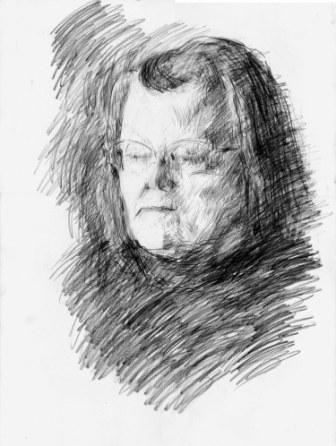Both my brother and I inherited a God hole from my mother’s father. About 1960 my brother received the call to become a minister. He wrote about this call in a poem titled “Softly.” “Softly, almost unnoticed, the spirit of Christ/ Enters and becomes. No hysteric act displays itself/ His coming unto us/…Jesus enters softly.”
I thought that if my beloved Robin was going to devote his life to the church, I should support him if I could. A year or so later, the local Methodist minister came to visit – he was visiting all the people in our apartment complex – and found me reading John Wesley’s biography. Soon I too was involved with the church. I’ve been attending church since then, although there was a period from 1965 until about 1975 when my attendance was sporadic but still faithful.
I can’t say that the church has been much influence on my religious life. Only occasionally do I feel there as if I am in the presence of God. Just once has Communion constituted a religious experience for me, and that was when Robin led a Watch Night service in our village church. Why then do I attend? I don’t know.
I had an intense period of reading religious books, from about 1965 until about 1990. My religious experiences have come often when I am either reading or writing. I was profoundly moved and changed by reading Boethius’ Consolation of Philosophy. I have led my life under its guidance ever since. Reading W.E. Hockings’ The Meaning of God in Human Experience changed the way I think of the world, of God and especially of what happens after death. I studied the Bible, read Biblical scholarship, and read works by the Mystics. About 1990 one of our ministers, Rod Sykes, led a seminar on the Reign of God, and that became a huge part of my thinking.
All my novels use a religious a structure but not an obvious one. (No one, not even a reviewer, has mentioned such a structure.) Flora used the Book of Revelations for its structure as written about in Farrer’s The Rebirth of Images. Wise-Ears used the Book of Proverbs. The Opening Eye and Samara used the first part of the Book of Acts. The Irrational Doorways used the Book of Acts and others of Paul’s writings. The current, unpublished novel, Temple House, uses what I can grasp of the Reign of God.
Subscribe to:
Post Comments (Atom)

1 comment:
Hmm. Have I discovered another Fred Buechner or Anne Lamott here? I find God more often in novels than in Biblical commentaries, so your post resonates with me a great deal. I also find mainline protestant church culture and liturgy rather stifling, but I attend because the church family itself, the people in other words, is where I find God. That said, the "finding" is a constant search through all the distractions {grin!}.
Post a Comment